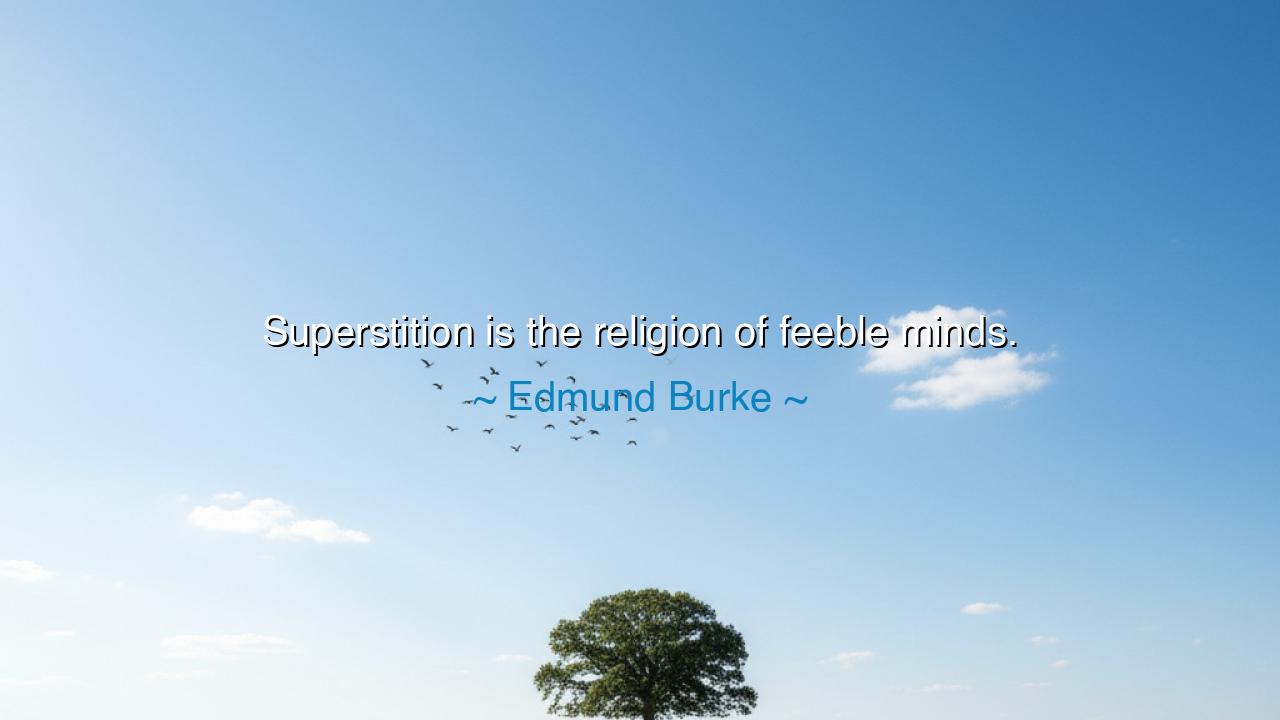
Superstition is the religion of feeble minds.






“Superstition is the religion of feeble minds.” – Edmund Burke
In these stern and illuminating words, Edmund Burke, the great statesman and philosopher of the eighteenth century, draws a sharp line between faith and fear. He warns humanity that when belief loses its light of reason, it falls into darkness—into the trembling shadow of superstition. To Burke, true religion uplifts the soul through wisdom, compassion, and reverence for truth, but superstition enslaves it, chaining the mind with terror and ignorance. His statement is not a scorn against faith itself, but a defense of the spirit’s higher calling—to believe not blindly, but bravely, with understanding.
The origin of this idea arose during an age of awakening, when men began to question the tyranny of dogma and the cruelty committed in the name of the divine. The Enlightenment was dawning, and thinkers like Burke stood between two worlds—one ancient, ruled by fear, and another rising, ruled by reason. Burke, though deeply respectful of religion, saw how easily it could decay into superstition when the intellect slept. When men cease to seek truth, he observed, they begin to worship signs and symbols, mistaking ritual for reverence and fear for faith. In this way, superstition becomes the counterfeit of religion, a hollow imitation of what is meant to set the soul free.
The feeble mind, in Burke’s eyes, was not one lacking intelligence, but one lacking courage—the courage to think, to question, to face uncertainty without panic. Such a mind, overwhelmed by the mysteries of existence, clings to false securities: omens, charms, and empty rituals. It trembles before every shadow, believing that unseen forces control its fate, and that only by appeasing them can it be safe. Thus, superstition thrives where understanding is absent and fear reigns supreme. It is born not of devotion, but of dread; not of love for the divine, but of terror at the unknown.
History is rich with examples of this decline. In the dark days of medieval Europe, men once feared eclipses as signs of divine wrath and burned the innocent as witches to ward off misfortune. The very faith meant to bring light became an instrument of oppression, as fear disguised itself in the robes of piety. The plague, the storm, the failure of crops—all were blamed on unseen curses or imagined sins. Yet when reason began to stir—when science dared to look through the telescope and peer into the heavens—the veil was lifted, and mankind discovered that truth was not a thing to be feared, but to be understood. In that awakening, superstition retreated, and religion, purified by reason, shone brighter than before.
Even in our modern age, superstition has not vanished—it merely wears new masks. It may not speak of witches or omens, but it still whispers in the hearts of those who would rather believe than know. It lives in conspiracy, in blind tribal loyalty, in the worship of symbols over substance. Whenever a person follows without questioning, obeys without understanding, or fears what they do not attempt to comprehend, superstition lives again. Burke’s warning echoes through the centuries: that when we abandon the strength of our reason, we become prey to the weakness of our fears.
And yet, his words do not condemn belief; they ennoble it. For true faith is not opposed to reason—it completes it. A wise man does not discard mystery, but he meets it with wonder, not with terror. The divine, Burke teaches us, is not honored by blind obedience, but by clear understanding and pure conscience. To believe rightly is to unite heart and mind—to see with both love and logic, knowing that the Creator gave us reason not to destroy faith, but to refine it.
So, my child of thought and spirit, take this teaching to heart: let your religion be strong, but let it be free of superstition. Do not fear what you do not know; seek to know it. Do not worship symbols; seek what they represent. Question bravely, for the truth fears no inquiry. Let reason be your compass and conscience your light. For as Burke reminds us, superstition is the religion of the weak, but wisdom joined with faith is the path of the strong—the path that leads not into the darkness of fear, but into the radiance of understanding.






AAdministratorAdministrator
Welcome, honored guests. Please leave a comment, we will respond soon